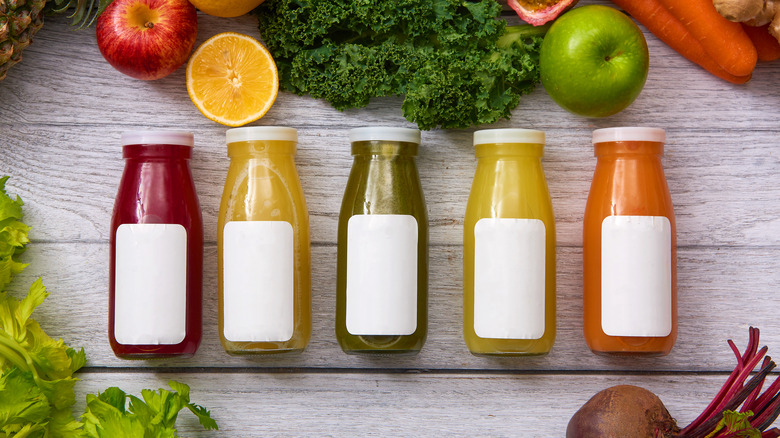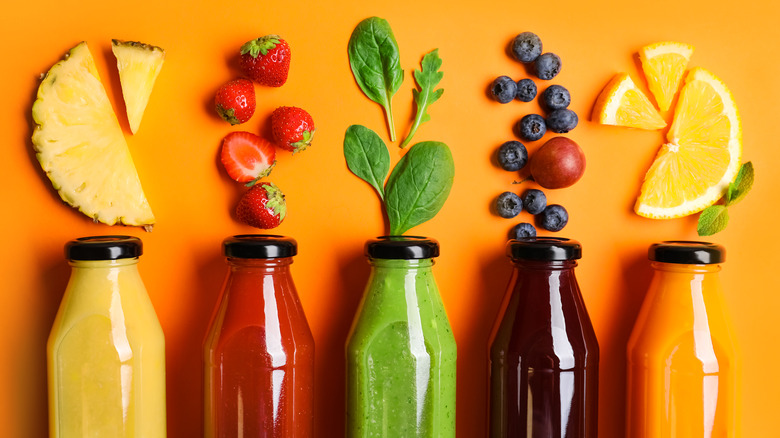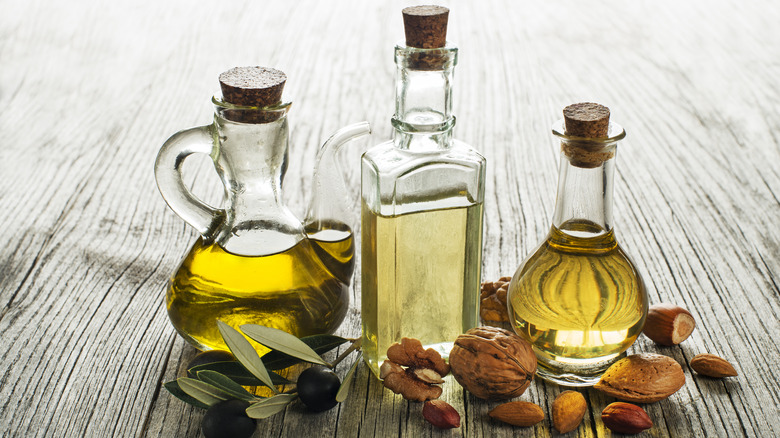What Does 'Cold-Pressed' Actually Mean For Fresh Juices?
When you're looking for a healthy beverage to satisfy your thirst, it can be tempting to reach for a bottle of good old fruit or vegetable juice. It's no secret that many of these juices are far less nutritious than they seem as they are often packed with sugar. That's where cold-pressed juices come in. These trendy drinks have made a huge impression on the health and wellness industry in recent years. Producers often advertise them as a better alternative to other juices in countless shops and cafes. Cold-pressed juices definitely aren't a miracle elixir but they do offer more benefits than their conventionally made counterparts.
At its core, cold pressing is a method of extracting juice from produce. Juice is traditionally made by pulverizing fruits or vegetables and then putting them in a centrifuge, which rapidly spins the ground up produce around to extract the juice. The juice gets exposed to high heat to eliminate bacteria to complete that process. Cold pressing, on the other hand, involves squeezing the juice out of fruits or vegetables with a hydraulic press and then using high pressure and refrigeration to pasteurize it and remove bacteria. Some cooking oils are also made with cold pressing and it leads to a number of benefits for oils and juices alike.
Pros and cons of cold-pressed juice
Cold-pressed juice is basically one of the two key methods for juicing fruits and vegetables. Compared to other methods, it extends the shelf life of the juice although it can be risky to drink cold-pressed juice after the expiration date. Because of this, these juices usually don't have any added sugars or preservatives, making them a healthier option than traditional juices in that regard. However, cold-pressed juice can still have a high sugar content because much of it comes from fruit. Cold-pressed juices also have the same vitamins and minerals as the produce used to make them, albeit in smaller quantities since much of the fruit or vegetable is lost in the process of juicing it. Because cold-pressed juices aren't exposed to high heat, however, they retain many of the nutrients regular juices lack. While a trendy cold-pressed juice may be a more health-conscious option than a normal juice, it's still no replacement for whole fruits and veggies.
Another pro of cold-pressed juices is that they last longer than fresh juice, around 40 days. Many people believe cold-pressed juice tastes fresher, too. Unfortunately, this sweet, refreshing flavor comes with a big price tag. A single serving can cost upwards of $10. The taste is great but there are no extreme health benefits so whether or not cold-pressed juice is worth the cost is up to you.
What about cold-pressed oil?
On your quest for cold-pressed juice, it's possible you'll come across some variety of cold-pressed oil. Cold-pressed oil, such as avocado, coconut, or olive oil, is also made without the use of heat. It is pulverized and pressed to separate the oil from the solid produce before it is bottled. While cold-pressed oil might not be any more nutritious than normal cooking oil, it does have fewer preservatives and is a great substitute for butter or other heavy oils. Cold-pressed oil has been described as having a better overall taste with fewer impurities.
At first glance, the term "cold-pressed" can sound like nothing more than a marketing term in the world of juices and oils. Cold-pressed items may certainly have higher costs than other options but there's no denying the freshness of its taste and ingredients. Whether you're sipping on a refreshing juice or drizzling a fine oil over your salad, the cold-pressed label means a cleaner, more natural product. So stock your fridge with cold-pressed juices for the next time you're in need of a sweet, unrefined pick-me-up.


